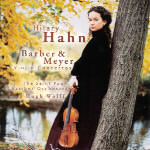Hilary Hahn continues to impress. Her Barber ranks with the finest available, and moreover, does so by taking a personal approach to the music, far removed from the Romantic effusions of the celebrated Stern/Bernstein collaboration. Both she and her accompanist, the estimable Hugh Wolff, offer a cooler, neo-classical view of the piece, particularly in the first movement which comes off as less rhapsodic, more highly contrasted, and more tightly put together than usual–very refreshing and vital music-making that many listeners may well prefer. Of course, the slow movement is nothing if not Romantic, and Hahn gives the lyricism its due, adding her own special elegance to the shaping of Barber’s sweetly nostalgic melodies.
The finale is simply a show-stopper. Not only does Hahn blow through the music with astounding effortlessness, but she does so while articulating with stunning clarity and purposefulness the music’s harmonic piquancy (aided to no small extent by Wolff’s immaculate accompaniment). In the process, she reveals countless little twists and turns of phrase that other performances breeze right over, and the general impression is of a much more substantial musical experience than usual. Even after excellent recent versions by Gil Shaham and Joshua Bell, this is an interpretation that makes you listen to the music anew, and there can be no higher praise than that.
It’s impossible to underestimate the importance of major artists performing and recording contemporary music, even if the works in question might not be immediately acclaimed as “classics”. That’s for future generations to decide. Hahn deserves a huge amount of credit (as do colleagues like Anne-Sophie Mutter and Elmar Oliveira) for using their fame to explore new music for their instrument. Edgar Meyer’s colorful Violin Concerto, composed expressly for Hahn, poses no major stylistic challenges to the listener, and for this reason it will probably be dismissed by many critics, both of the professional and armchair variety. But it’s a lovely piece, beautifully written for the violin, and it makes the perfect complement to Barber’s concerto.
Cast in two large sections, the work opens with a soulful, folk-like tune that sounds a lot like the soundtrack from the movie Fargo. This is no disparagement: Carter Burwell’s film score is marvelous. The folk tune alternates with quicker passages featuring lively solo playing over a gently syncopated accompaniment. The second part starts with a slow movement: elegantly simple music consisting of solo violin over a series of luminous, long-held chords, with delicate woodwind roulades beneath. This yields to a country fiddle-style dance episode, a brief return of the slow music, and a whirlwind conclusion. The piece is instantly memorable, scored so deftly that every note of the solo is clearly audible, and sounds like great fun to play.
Despite the music’s outward simplicity, there’s a lot of craft in this piece. It’s clear that Meyer thought long and hard about serious musical issues like proper instrumental balance, formal shapeliness, effective solo writing, and tempo contrast, and it seems to me that his success is undeniable. I can’t imagine a better introduction to this appealing new work than the one provided by Hahn and Wolff. Don’t miss this marvelous disc.
































